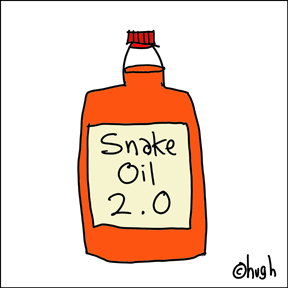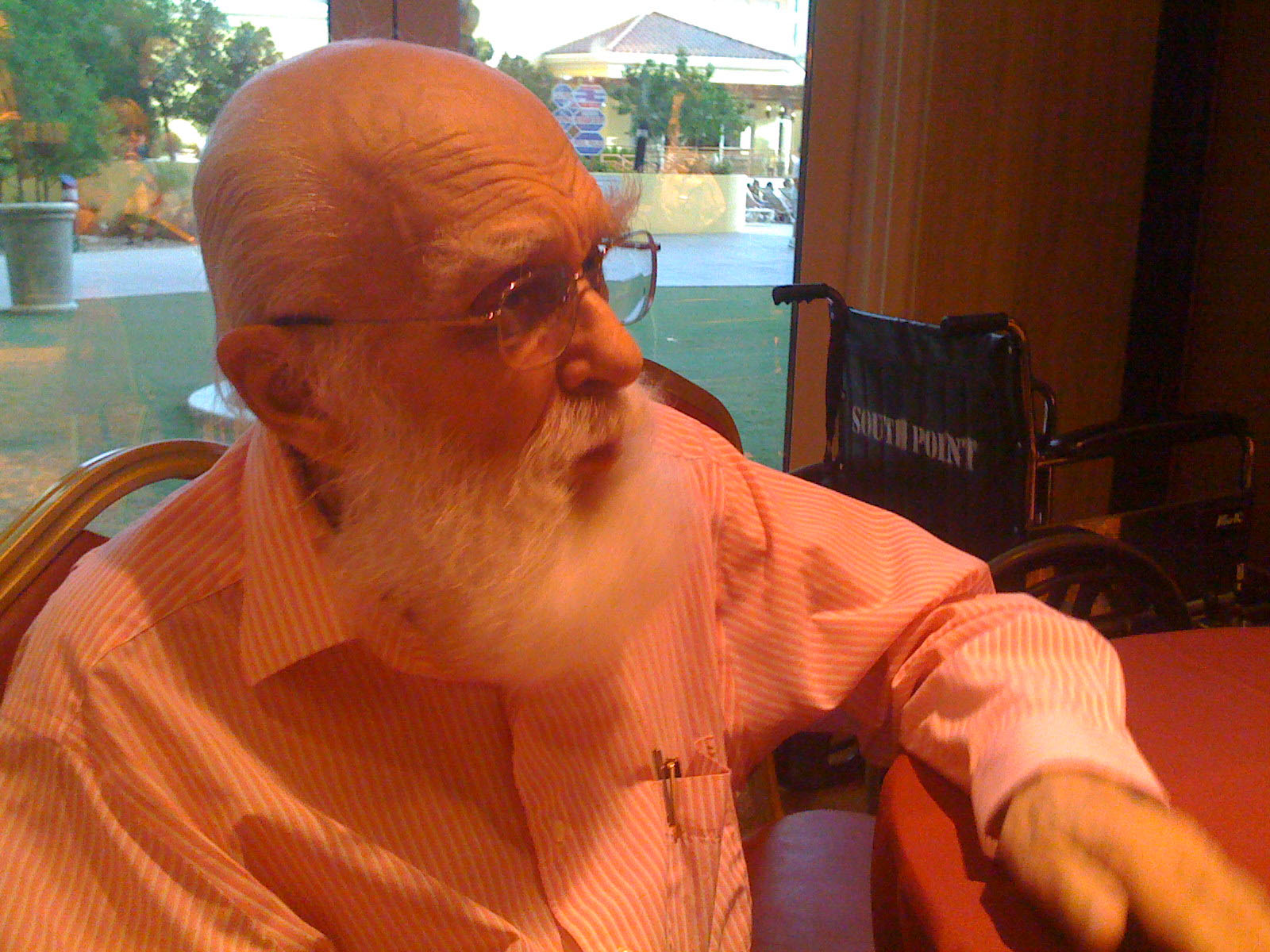October 17th, 2010 by Peter Lipson, M.D. in Better Health Network, Health Tips, Opinion, Quackery Exposed, Research
No Comments »

If you google “low testosterone” you’ll see lots of ads for testosterone replacement. Some are from pharmaceutical companies that sell testosterone, others from obvious snake-oil salesmen.
Both types of ads list vague sets of symptoms, encourage you to believe that they are pathologic, and want to sell you something to make you better. For example, the pharmaceutical company Solvay gives you a handy guide for speaking to your doctor, and a quiz to see if you have “low T.” The quiz asks some questions that may be useful, but also asks very general questions about your sense of well being. Read more »
*This blog post was originally published at Science-Based Medicine*
November 30th, 2009 by Dr. Val Jones in Announcements, Health Policy, Quackery Exposed
No Comments »
 I’ve been warning folks about this for years – and alas, fake medicine and quackery has finally oiled its way into the healthcare reform bills. We are in the midst of a growing primary care shortage, and on the brink of vastly expanding health insurance coverage without increasing the supply of physicians and nurses. How will our country solve the supply/demand mismatch? Potentially by allowing people without appropriate training in science and medicine to become your “medical home.” That’s right – your next doctor or nurse may be someone with an online degree in snake oil salesmanship.
I’ve been warning folks about this for years – and alas, fake medicine and quackery has finally oiled its way into the healthcare reform bills. We are in the midst of a growing primary care shortage, and on the brink of vastly expanding health insurance coverage without increasing the supply of physicians and nurses. How will our country solve the supply/demand mismatch? Potentially by allowing people without appropriate training in science and medicine to become your “medical home.” That’s right – your next doctor or nurse may be someone with an online degree in snake oil salesmanship.
I know it’s hard to believe… But please read this press release (reproduced below) for more information – and call your Senator to complain. Maybe we’ll be able to get these sections removed before a bill passes? Read more »
November 3rd, 2009 by Dr. Val Jones in Health Policy, News, Opinion, Quackery Exposed
No Comments »
Today the LA Times described a bizarre and troublesome healthcare reform bill provision that would require Medicare to pay for Christian Science Prayer as a medical treatment:
…a little-noticed provision in the healthcare overhaul bill would require insurers to consider covering Christian Science prayer treatments as medical expenses.
The provision was inserted by Sen. Orrin G. Hatch (R-Utah) with the support of Democratic Sens. John F. Kerry and the late Edward M. Kennedy, both of Massachusetts, home to the headquarters of the Church of Christ, Scientist.
The measure would put Christian Science prayer treatments — which substitute for or supplement medical treatments — on the same footing as clinical medicine. While not mentioning the church by name, it would prohibit discrimination against “religious and spiritual healthcare.”
Of course, I had warned about this very thing over a year ago on KevinMD’s blog – something I wish the LA Times had picked up on then. Read more »
October 29th, 2009 by Peter Lipson, M.D. in Better Health Network, Quackery Exposed
1 Comment »

Dr. Weil is often seen as the smiling “mainstream” of alternative medicine. He’s a real doctor (unlike, say, Gary Null), and much of what he advocates is standard and uncontroversial nutritional advice. But Weil illustrates the two biggest problems with so-called alternative medicne: once you’ve decided science is dispensible, the door is open to anything, no matter how insane; and no matter how altruistic you may start, sooner or later you start selling snake oil. Most doctors out there are working hard to help their patients prevent and overcome disease use the available evidence. Others decide that science is too constraining and start practicing at the periphery of knowledge, throwing plausibility and ethics to the wind.
The fact that Weil claims to donate to charity all of his ill-gotten gains does not mitigate the harm he causes. Read more »
*This blog post was originally published at Science-Based Medicine*
July 18th, 2009 by Dr. Val Jones in Expert Interviews, Quackery Exposed
3 Comments »
 James Randi, perhaps better known as “The Amazing Randi” has spent most of his life performing magic shows. In 1996 he created the James Randi Educational Foundation (JREF) designed to expose the fraudulent claims made by psychics, faith healers, and snake oil salesmen. The ultimate goal of the JREF is to create a new generation of critical thinkers – people who will not be hoodwinked by the aforementioned hucksters.
James Randi, perhaps better known as “The Amazing Randi” has spent most of his life performing magic shows. In 1996 he created the James Randi Educational Foundation (JREF) designed to expose the fraudulent claims made by psychics, faith healers, and snake oil salesmen. The ultimate goal of the JREF is to create a new generation of critical thinkers – people who will not be hoodwinked by the aforementioned hucksters.
I had the good fortune of interviewing Mr. Randi briefly at the recent conference known as “The Amazing Meeting.” I was eager to pick his brain about human behavior and magical thinking. This is what I learned…
Randi identified certain groups of people who seem to be more susceptible to magical thinking and/or belief in the paranormal. According to him, the top two are:
1. News reporters. Although at first I wasn’t sure if Randi meant that reporters like a good story versus they believe a good story – he told me that in his experience, they were some of the most gullible people on earth. In fact, they were more interested in implausible stories than true ones – and Randi said that the more fantastical his explanation for phenomena, the more likely they were to believe it and write about it.
2. Academics. This surprised me since I assumed that this group would actually be less susceptible. Randi suggested that they are more likely to be taken in because they are single-minded about phenomena. They are over confident in their ability to understand how things work, and when something cannot be explained in their framework, they’re willing to attribute it to the paranormal.
Who are the least susceptible? Children. Why? Because they are simple thinkers, and harder to distract. The art of magic is in distraction of the sophisticated mind. Children tend to be very concrete, so they don’t expect things to happen with hand-waving and flourishes. They keep their eye on the coin (or other item being transferred from hand to hand), and are more likely to know where it is at all times.
To wrap up our short interview, I asked Randi if he could explain why people believe in magic, fantasy, and the paranormal? He responded simply:
Ultimately it’s not about intelligence or lack thereof. It’s about people not wanting to accept that life is random, suffering is inevitable, and there is no good reason for bad things happening.
What do you make of Randi’s observations?













